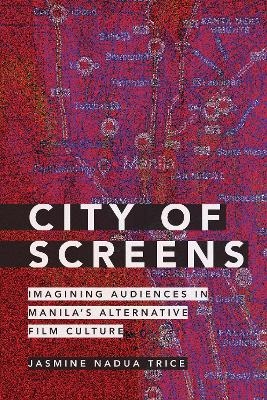
City of Screens
Imagining Audiences in Manila's Alternative Film Culture
Seiten
2021
Duke University Press (Verlag)
978-1-4780-1169-9 (ISBN)
Duke University Press (Verlag)
978-1-4780-1169-9 (ISBN)
Jasmine Nadua Trice examines the politics of cinema circulation in early-2000s Manila, showing how the rising independent Philippine cinema movement has been a site of contestation between filmmakers and the state, each constructing different notions of a prospective, national public film audience.
In City of Screens Jasmine Nadua Trice examines the politics of cinema circulation in early-2000s Manila. She traces Manila's cinema landscape by focusing on the primary locations of film exhibition and distribution: the pirated DVD district, mall multiplexes, art-house cinemas, the university film institute, and state-sponsored cinematheques. In the wake of digital media piracy and the decline of the local commercial film industry, the rising independent cinema movement has been a site of contestation between filmmakers and the state, each constructing different notions of a prospective, national public film audience. Discourses around audiences become more salient given that films by independent Philippine filmmakers are seldom screened to domestic audiences, despite their international success. City of Screens provides a deeper understanding of the debates about the competing roles of the film industry, the public, and the state in national culture in the Philippines and beyond.
In City of Screens Jasmine Nadua Trice examines the politics of cinema circulation in early-2000s Manila. She traces Manila's cinema landscape by focusing on the primary locations of film exhibition and distribution: the pirated DVD district, mall multiplexes, art-house cinemas, the university film institute, and state-sponsored cinematheques. In the wake of digital media piracy and the decline of the local commercial film industry, the rising independent cinema movement has been a site of contestation between filmmakers and the state, each constructing different notions of a prospective, national public film audience. Discourses around audiences become more salient given that films by independent Philippine filmmakers are seldom screened to domestic audiences, despite their international success. City of Screens provides a deeper understanding of the debates about the competing roles of the film industry, the public, and the state in national culture in the Philippines and beyond.
Jasmine Nadua Trice is Assistant Professor of Cinema and Media Studies at the University of California, Los Angeles.
Acknowledgments ix
Introduction 1
1. Revanchist Cinemas and Bad Audiences, Multiplex Fiestas and Ideal Publics 39
2. The Quiapo Cinematheque and Urban-Cinematic Authenticity 79
3. Alternative Exhibition and the Rhythms of the City 113
4. "Not for Public Exhibition": Cinema Regulation, Alternative Cinema, and a Rational Body Politic 153
5. "Hollywood Is Not Us": National Circulation and the Speculative State 189
Epilogue 230
Notes 241
Bibliography 281
Index 299
| Erscheinungsdatum | 16.03.2021 |
|---|---|
| Zusatzinfo | 21 illustrations |
| Verlagsort | North Carolina |
| Sprache | englisch |
| Maße | 152 x 229 mm |
| Gewicht | 454 g |
| Themenwelt | Kunst / Musik / Theater ► Film / TV |
| Sachbuch/Ratgeber ► Geschichte / Politik ► Allgemeines / Lexika | |
| Geisteswissenschaften ► Geschichte ► Regional- / Ländergeschichte | |
| Sozialwissenschaften ► Kommunikation / Medien ► Medienwissenschaft | |
| ISBN-10 | 1-4780-1169-6 / 1478011696 |
| ISBN-13 | 978-1-4780-1169-9 / 9781478011699 |
| Zustand | Neuware |
| Haben Sie eine Frage zum Produkt? |
Mehr entdecken
aus dem Bereich
aus dem Bereich
die Reise der Menschheit : zwischen Aufbruch und Scheitern
Buch | Softcover (2023)
Ullstein Taschenbuch Verlag
14,99 €


